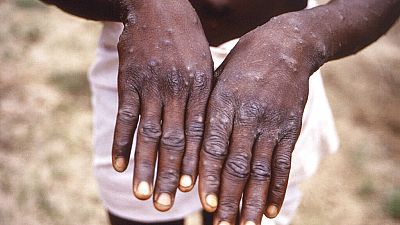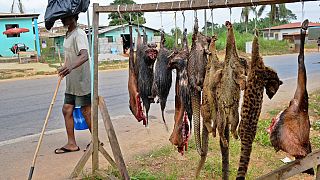Epidemics
Scientists who have followed the numerous monkeypox outbreaks in Africa say they are baffled by the recent spread of the disease to Europe and North America.
Until now, cases of the smallpox-related disease have only been seen in people with links to central and west Africa.
However, over the past week, Britain, Spain, Portugal, Italy, the United States, Sweden and Canada have all reported infections, mainly in young men who had never travelled to Africa.
France, Germany, Belgium and Australia confirmed their first cases of monkeypox on Friday.
"I am stunned by this. Every day I wake up and see that new countries are being infected," said Oyewale Tomori, a virologist who headed the Nigerian Academy of Sciences and sits on several World Health Organisation (WHO) advisory boards.
"This is not the kind of spread we've seen in West Africa, so there may be something new happening in the West," he added.
Skin rash
Monkeypox usually causes fever, chills, a rash and lesions on the face or genitals. The WHO estimates that the disease is fatal for one in ten people, but smallpox vaccines protect, and some antiviral drugs are also being developed.
One theory being explored by the UK health authorities is that the disease is sexually transmitted. Health authorities have asked doctors and nurses to be on the alert for potential cases, but have said the risk to the general population is low.
According to the WHO, Nigeria reports about 3,000 cases of monkeypox a year. Outbreaks usually occur in rural areas, where people are in close contact with infected rats and squirrels, Oyewale Tomori said. He added that many cases probably go unnoticed.
He hopes that the appearance of monkeypox cases in Europe and other countries will lead to a better scientific understanding of the disease.
The head of WHO's emergency response, Dr Ibrahima Soce Fall, acknowledged this week that there were still "so many unknowns in terms of transmission dynamics, clinical features (and) epidemiology".
Sexual transmission
On Friday, the UK's Health Security Agency reported 11 new cases of monkeypox, saying that "a notable proportion" of the most recent infections in the UK and Europe were among young men with no history of travel to Africa, who are gay, bisexual or have sex with men.
The Spanish and Portuguese authorities also said that their cases involved young men who mainly had sex with other men and indicated that these cases were detected when the men presented with lesions at sexual health clinics.
The experts stressed that they do not know whether the disease is transmitted through sex or other close sexual contacts.
Nigeria has not experienced sexual transmission, said Oyewale Tomori, but he noted that viruses that were not initially known to be sexually transmitted, such as Ebola, were later proven after larger outbreaks showed different patterns of spread. The same could be true of monkeypox, according to Oyewale Tomori.
Sequencing
In Germany, Health Minister Karl Lauterbach said the government was confident that the outbreak could be contained. He said the virus was being sequenced to see if there were any genetic changes that could have made it more infectious.
Rolf Gustafson, a professor of infectious diseases, told Swedish television station SVT that it was "very difficult" to imagine the situation getting worse. "We will certainly find more cases in Sweden, but I don't think there will be an epidemic in any way," he said. "There is nothing to suggest that at the moment.
The scientists said that while it is possible that the first patient in the epidemic caught the disease while in Africa, what is happening now is exceptional.
"We have never seen anything like what is happening in Europe," said Christian Happi, director of the African Centre of Excellence for Infectious Disease Genomics. "We haven't seen anything to say that the transmission patterns of monkeypox have changed in Africa. So if something different is happening in Europe, then Europe needs to investigate that."
Vaccination campaigns
Christian Happi also pointed out that the suspension of smallpox vaccination campaigns after the disease was eradicated in 1980 could inadvertently encourage the spread of monkeypox. Smallpox vaccines also protect against monkeypox, but mass vaccination was stopped decades ago.
"With the exception of people in Central and West Africa who may have some immunity to smallpox due to previous exposure, the absence of smallpox vaccination means that no one has immunity to smallpox," said Christian Happi.
Shabir Mahdi, professor of vaccinology at the University of the Witwatersrand in Johannesburg, said a detailed investigation into the outbreak in Europe, including determining the identity of the first patients, was now essential.
"We really need to understand how this started and why the virus is now gaining ground," he said. "In Africa, monkeypox outbreaks have been very controlled and infrequent. If this is changing, we really need to understand why."













01:55
Burkina Faso's only eye doctor for children sees trauma of both play and conflict
01:04
South Africa reports new bird flu outbreak on poultry farms
Go to video
Over 40 killed in attack on Sudanese hospital: WHO Chief condemns “Appalling” strike
Go to video
Ghana confirms 34 new Mpox cases, total rises to 79
01:07
WHO says the mpox outbreak remains a public health concern
01:37
Sudan faces rapidly-spreading cholera outbreak, 1000 daily cases in capital